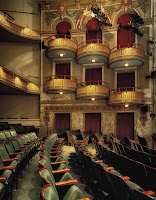This year’s Pulitzer Prize for drama went to Sanaz Toossi’s English, a story of four Iranians studying for a foreign language exam in Tehran. The play explores issues of identity, belonging, and, most gratifyingly for writers, language. I was lucky enough to see a production at the Berkeley Repertory Theater in April and wholeheartedly agree with the Pulitzer committee’s decision.
The last play I saw at that
particular theater (in 2017) was . . . not as great. It was a musical
adaptation of Mira Nair’s critically acclaimed 2001 film Monsoon Wedding,
which had originally been announced for an abandoned Broadway run several years
earlier. I was not alone in thinking the play still needed a lot of work. Variety
called it a “clunky contraption” that was “loud, broad and close to charmless.”
Ouch.
For any writer, in any genre, writing
means revising. I am grateful that as a fiction writer rather than a playwright,
the early versions and multiple revisions of my work are not played out in a literal
spotlight for public judgment. Instead, I have writer friends who generously
read drafts of my short stories and offer feedback. I have an online critique
group that shares comments and insights. I appreciate all the input, including
the less-than-enthusiastic reads, even more so because it is delivered in a
mutually respectful, nurturing way.
As unsettling as I personally find the thought of public criticism of my unpolished work, I am aware that the theater has a long history of out-of-town tryouts. Shows evolve as audiences and critics react to each iteration, changing and improving along the way. Just as my reader friends and critique group help hone my work before I submit it for possible publication, those regional theater stints help refine a show before it heads for the big time in New York.
I actually played a role in
shaping another musical currently setting its sights on Broadway. The show held
its first staged reading here in Birmingham, and afterward I and the rest of the
audience filled out feedback cards and discussed our reactions with the
creators. The responses were thoughtful and well-intentioned even when critical,
and my participation in that theatrical critique group gave me a new
perspective on the value of widely sharing works in progress. The show returned
the next year in a revised version, and I’d like to think my honest input
helped to make it better. Given that our local theater has won two Tony Awards
for productions that it premiered and co-produced, I enjoy the idea I may have
played a small part in another such success someday.
And Monsoon Wedding? A
much-revised version is now playing in Brooklyn, a lot closer to its Broadway goals.
That gives me faith that my personal experience with and openness to feedback will
keep moving me closer to my own writing dreams.
Have your theater experiences ever
given you insight into your own writing?


I definitely find the way plays are workshopped to be interesting. Hadn't thought about it like feedback writers get on early drafts, but I see the connection now. And, since it is a play, you really can't get good feedback on something just from reading the page, can you?
ReplyDeleteI've never participated in the production process of a play, but I did see the realtionship between trial runs for plays and beta readers for authors.
ReplyDeleteI think critiquing a play would be so much more complicated than beta-reading a book. So many moving parts and multiple senses with a play.
ReplyDeleteWhat a delightful post! My experiences with theater have been limited to acting and watching. I admire those who can write scripts, but freely admit that it’s a foreign language!
ReplyDeleteYes! As a beginning writer, I watched the body language and facial expressions by the singers in the local university opera productions.
ReplyDeleteI agree with Susan. And I have little experience with theater. But I'm glad you had an opportunity to contribute. Getting honest and constructive input is invaluable.
ReplyDelete